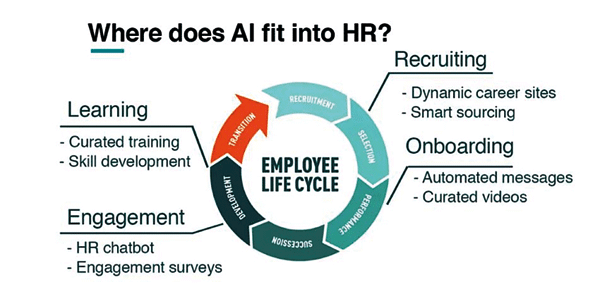AI Agents Step Into HR: Digital Colleagues Redefine the Workplace.
View(s):
“From recruitment and compliance to forecasting and employee engagement, autonomous AI agents are reshaping human resourcesfreeing professionals to focus on culture, trust, and strategy.”
In a quiet shift that could reshape the workplace as we know it, artificial intelligence is no longer confined to powering search engines, automating payroll, or helping us write better emails. Increasingly, organisations are welcoming a new kind of digital colleague into the human resources (HR) department: the AI agent. Unlike the early generation of chatbots that offered canned responses, today’s AI agents are intelligent, adaptive, and proactive capable of taking on tasks once reserved for human administrators and analysts.
From Assistants to Autonomous Colleagues
The HR profession has seen waves of technology over the past three decades: databases for storing employee records, self-service portals for leave requests, and robotic process automation (RPA) for repetitive workflows. Yet these tools always needed human oversight to function effectively. AI agents, by contrast, bring a new quality: autonomy.
These digital colleagues can remember context, learn from past interactions, and improve their own performance over time. Imagine an HR officer who not only schedules interviews, but also recalls the most effective recruitment channels from previous hiring rounds, adapts to new compliance rules without prompting, and refines onboarding processes based on employee feedback. That, in essence, is the promise of agentic AI.
Rethinking Talent Acquisition
Recruitment is one of the most resource-intensive parts of HR, and AI agents are rapidly changing the playbook. They scan vast pools of online profiles and résumés, highlight the best matches for job descriptions, and even handle first-round screening through conversational interviews. By reducing bias-laden “gut feel” decisions, they can help organizations create fairer and more inclusive candidate shortlists.
One global firm, for instance, reported that its AI agent was able to cut average hiring times from eight weeks to just three, while also improving candidate satisfaction. Instead of drowning in paperwork, recruiters were freed to focus on building authentic relationships with top talent.
Beyond Paperwork: Agents in Administration
HR professionals often joke that their jobs involve “a thousand small fires.” Payroll questions, benefits enrollment, leave policies, and compliance queries consume much of the working week. AI agents are increasingly stepping in as the first line of support, answering routine employee questions around the clock, updating records automatically, and sending reminders before deadlines lapse.
This does not replace the HR team it amplifies it. Employees receive quick, accurate answers while human staff can devote energy to strategic work such as leadership development, employee well-being, or diversity initiatives.
Performance, Compliance, and Forecasting
AI agents also shine in areas that require continuous monitoring and data analysis. By analysing employee surveys, performance reviews, and productivity metrics, they can flag potential issues early such as departments with declining morale or teams at risk of high turnover.
On the compliance front, agents scan regulatory changes, update policy frameworks, and ensure that organisations remain aligned with evolving labour laws. They also act as forecasters, predicting workforce needs months or even years ahead. In volatile markets, such foresight can mean the difference between thriving and scrambling.
Augmentation, Not Replacement
Of course, talk of AI in the workplace often raises fears of job displacement. But IBM and other thought leaders emphasise that AI agents are designed to augment, not replace HR teams. They are colleagues, not competitors. By handling the routine, they allow human professionals to focus on what cannot be automated: empathy, trust-building, coaching, and shaping culture.
In fact, the most successful deployments are those where AI agents are treated as part of a collaborative ecosystem, with clear oversight, accountability, and transparency. An AI that makes a poor hiring suggestion or misclassifies an expense claim still requires human judgment to correct.
The Challenges Ahead
The rise of autonomous digital colleagues also brings new questions. Who is responsible when an AI agent makes a mistake? How transparent should its decision-making be? And how do managers ensure that employees trust not fear their digital counterpart?
These questions are not trivial. An HR team that embraces AI without safeguards may erode employee confidence. On the other hand, a carefully designed system can boost fairness, responsiveness, and strategic agility.
A Future with Digital Colleagues
Looking ahead, AI agents are likely to become as common in HR as email once was. Their ability to combine speed, memory, and foresight makes them invaluable in a world where talent is scarce and organisational agility is paramount. The HR office of the near future might include not only recruiters, benefits managers, and training officers, but also one or two digital colleagues quietly running forecasts, screening applicants, and keeping compliance in check.
For employees, this could mean faster answers, smoother onboarding, and fairer opportunities. For HR professionals, it means liberation from the drudgery of paperwork and a chance to focus on people rather than processes. And for organisations, it means a new era of data-driven, people-centric decision-making.
The bottom line is clear: when AI agents join the HR department, they don’t replace the “human” in human resources they help bring it back to the center.
HitAd.lk is the best and biggest mobile phone market in Sri Lanka, and we guarantee you will find what you need here from our extensive listing of mobile phones for sale in Sri Lanka. Whether it’s a budget-priced smartphone for communication, or higher end features with advanced connectivity, there are many different options from which to choose from on our site!


